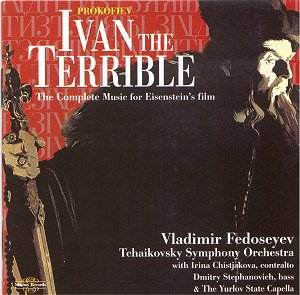Serge PROKOFIEV (1891-1953).
Ivan the Terrible - Complete Film Music.
 Tchaikovsky Symphony
Orchestra/Vladimir Fedoseyev with Irina Chistjakova (contralto); Dmitry
Stephanovich (bass); Yurlov State Capella; Children's Choir of Studio
Vesna.
Tchaikovsky Symphony
Orchestra/Vladimir Fedoseyev with Irina Chistjakova (contralto); Dmitry
Stephanovich (bass); Yurlov State Capella; Children's Choir of Studio
Vesna.
 Nimbus NI5662/3
[DDD] [two discs] [99'35]
Nimbus NI5662/3
[DDD] [two discs] [99'35]

Buy
through MusicWeb for £16.00 postage
paid World-wide.
Purchase
button
Prokofiev's music for Ivan the Terrible dates
from the same period as his opera War and Peace (early to mid
forties). This is the first compete recording of the music from Eisenstein's
film, and thus immediately possesses an urgent musicological interest.
The booklet notes reflect this: they are extensive (English only,
so no translations to take up space) and helpful, tracing the work's
genesis, reproducing some of Eisenstein's drawings and providing both
synopsis and musical commentary.
Collectors may be familiar with Abram Stasevich's
Oratorio after the film score (available in several versions, including
the charismatic Gergiev on Philips 456 645-2). Hearing this set is
another experience, however, one brought to life by Fedoseyev and
his Moscow forces, who seem to play with an almost evangelical zeal.
Young Ivan's March receives a relentless performance, for example,
and provides an apt contrast to The Song of the Old Nurse for Little
Ivan, sung with echt-Russian creaminess by Chistjakova.
Fedoseyev is happy to point up correspondences with
Mussorgsky's Boris Godunov: especially in Song of the Oprichniki
(CD2, track 11), a close relation to Varlaam's By the walls of
Kazan the mighty fortress. But there is no mistaking Prokofiev's
own individual voice running through the score. Fedoseyev is also
a master of the cumulative, dramatic scene. The extended, dark Ivan
pleads with the Boyars is a particularly striking example of this.
He also has no shortage of breadth and nobility when required.
Choral contributions, totally in the full-bodied
Russian tradition, are notable for their intensity: Eternal Remembrance
is particularly effective because it is given a cappella. The
chorus achieves remarkably convincing patriotic fervour in Sofrony's
Cherubic Song.
The recording is up-front, although such close miking
does not seem at odds with the larger-than-life events and emotions
being portrayed.
Reviewer
Colin Clarke
Performance

Recording

